Detailed Analysis of Literary Devices in 'The Cask of Amontillado'
VerifiedAdded on 2023/01/04
|6
|1493
|37
Essay
AI Summary
This essay provides an analysis of the literary devices used in Edgar Allan Poe's short story, "The Cask of Amontillado." The primary focus is on the pervasive use of irony, specifically situational and verbal irony, and how these devices contribute to the story's theme of revenge. The essay explores instances of irony, such as Fortunato's name and Montresor's deceptive behavior, and how they create suspense and highlight the protagonist's manipulative nature. It also examines the role of verbal exchanges in creating irony and revealing the characters' motivations. The essay concludes that the effective use of irony is a key element in making "The Cask of Amontillado" a compelling tale of revenge, emphasizing how Poe uses these devices to shape the readers' understanding of the story's events and themes. References to academic sources support the analysis.
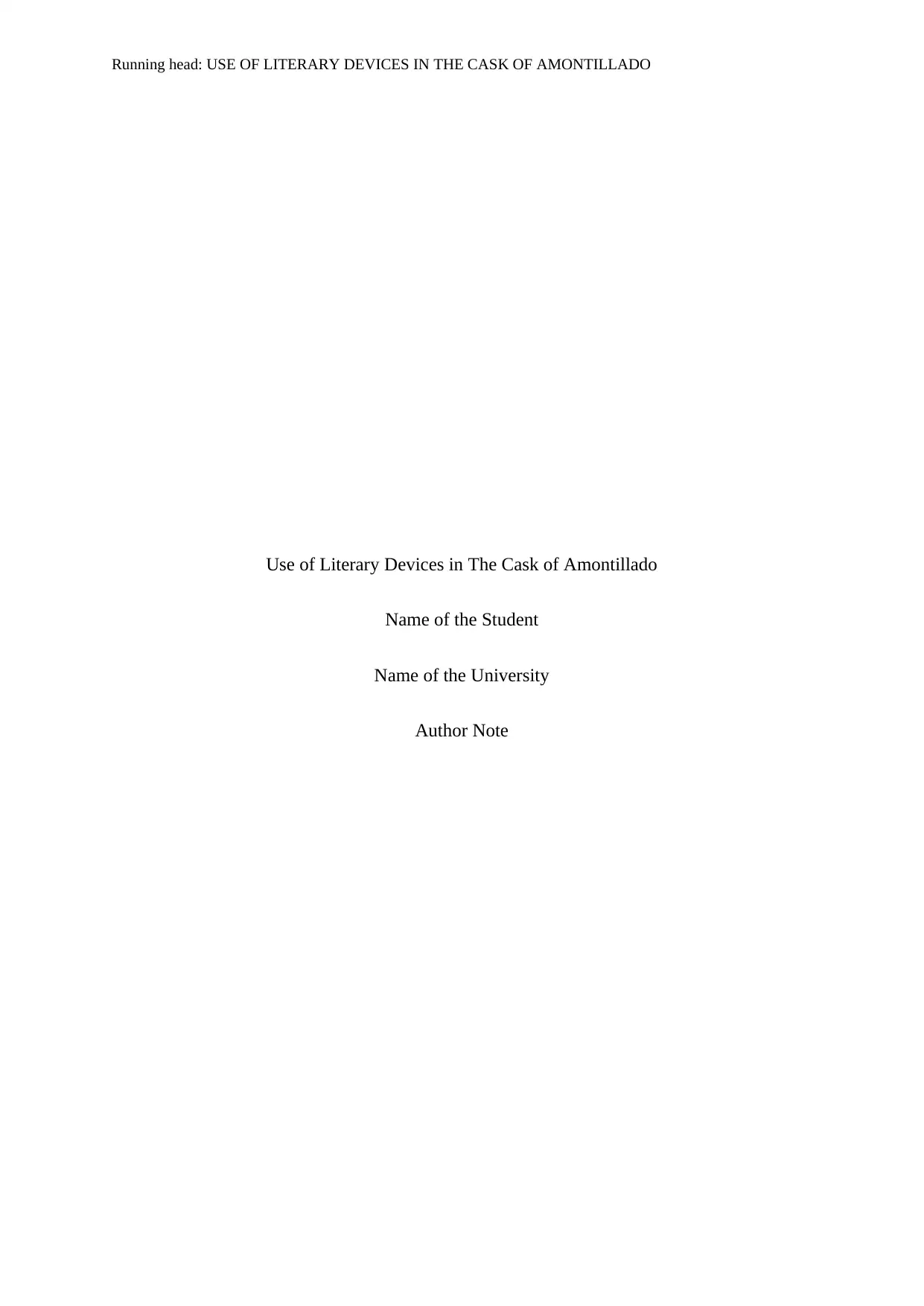
Running head: USE OF LITERARY DEVICES IN THE CASK OF AMONTILLADO
Use of Literary Devices in The Cask of Amontillado
Name of the Student
Name of the University
Author Note
Use of Literary Devices in The Cask of Amontillado
Name of the Student
Name of the University
Author Note
Paraphrase This Document
Need a fresh take? Get an instant paraphrase of this document with our AI Paraphraser
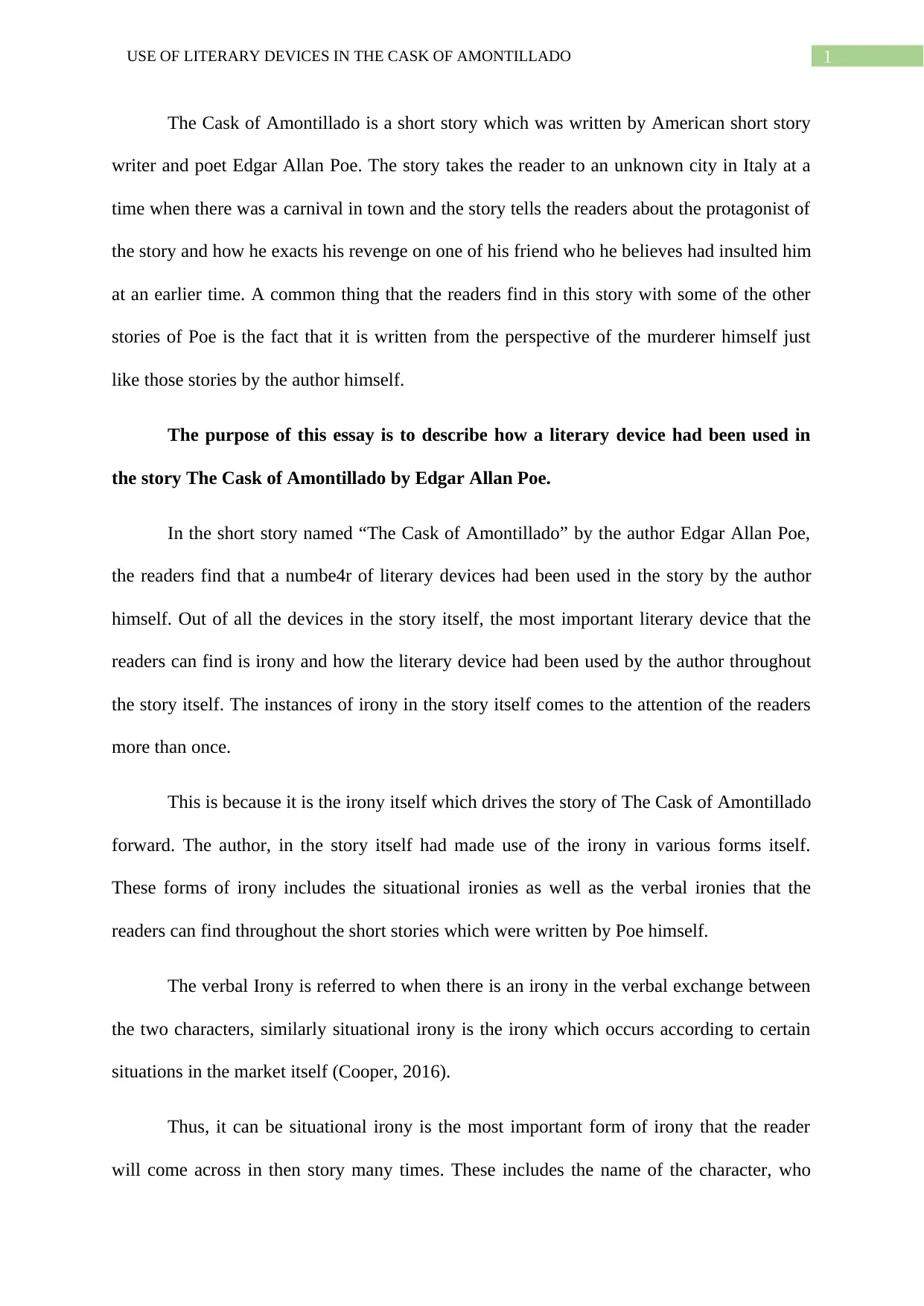
1USE OF LITERARY DEVICES IN THE CASK OF AMONTILLADO
The Cask of Amontillado is a short story which was written by American short story
writer and poet Edgar Allan Poe. The story takes the reader to an unknown city in Italy at a
time when there was a carnival in town and the story tells the readers about the protagonist of
the story and how he exacts his revenge on one of his friend who he believes had insulted him
at an earlier time. A common thing that the readers find in this story with some of the other
stories of Poe is the fact that it is written from the perspective of the murderer himself just
like those stories by the author himself.
The purpose of this essay is to describe how a literary device had been used in
the story The Cask of Amontillado by Edgar Allan Poe.
In the short story named “The Cask of Amontillado” by the author Edgar Allan Poe,
the readers find that a numbe4r of literary devices had been used in the story by the author
himself. Out of all the devices in the story itself, the most important literary device that the
readers can find is irony and how the literary device had been used by the author throughout
the story itself. The instances of irony in the story itself comes to the attention of the readers
more than once.
This is because it is the irony itself which drives the story of The Cask of Amontillado
forward. The author, in the story itself had made use of the irony in various forms itself.
These forms of irony includes the situational ironies as well as the verbal ironies that the
readers can find throughout the short stories which were written by Poe himself.
The verbal Irony is referred to when there is an irony in the verbal exchange between
the two characters, similarly situational irony is the irony which occurs according to certain
situations in the market itself (Cooper, 2016).
Thus, it can be situational irony is the most important form of irony that the reader
will come across in then story many times. These includes the name of the character, who
The Cask of Amontillado is a short story which was written by American short story
writer and poet Edgar Allan Poe. The story takes the reader to an unknown city in Italy at a
time when there was a carnival in town and the story tells the readers about the protagonist of
the story and how he exacts his revenge on one of his friend who he believes had insulted him
at an earlier time. A common thing that the readers find in this story with some of the other
stories of Poe is the fact that it is written from the perspective of the murderer himself just
like those stories by the author himself.
The purpose of this essay is to describe how a literary device had been used in
the story The Cask of Amontillado by Edgar Allan Poe.
In the short story named “The Cask of Amontillado” by the author Edgar Allan Poe,
the readers find that a numbe4r of literary devices had been used in the story by the author
himself. Out of all the devices in the story itself, the most important literary device that the
readers can find is irony and how the literary device had been used by the author throughout
the story itself. The instances of irony in the story itself comes to the attention of the readers
more than once.
This is because it is the irony itself which drives the story of The Cask of Amontillado
forward. The author, in the story itself had made use of the irony in various forms itself.
These forms of irony includes the situational ironies as well as the verbal ironies that the
readers can find throughout the short stories which were written by Poe himself.
The verbal Irony is referred to when there is an irony in the verbal exchange between
the two characters, similarly situational irony is the irony which occurs according to certain
situations in the market itself (Cooper, 2016).
Thus, it can be situational irony is the most important form of irony that the reader
will come across in then story many times. These includes the name of the character, who
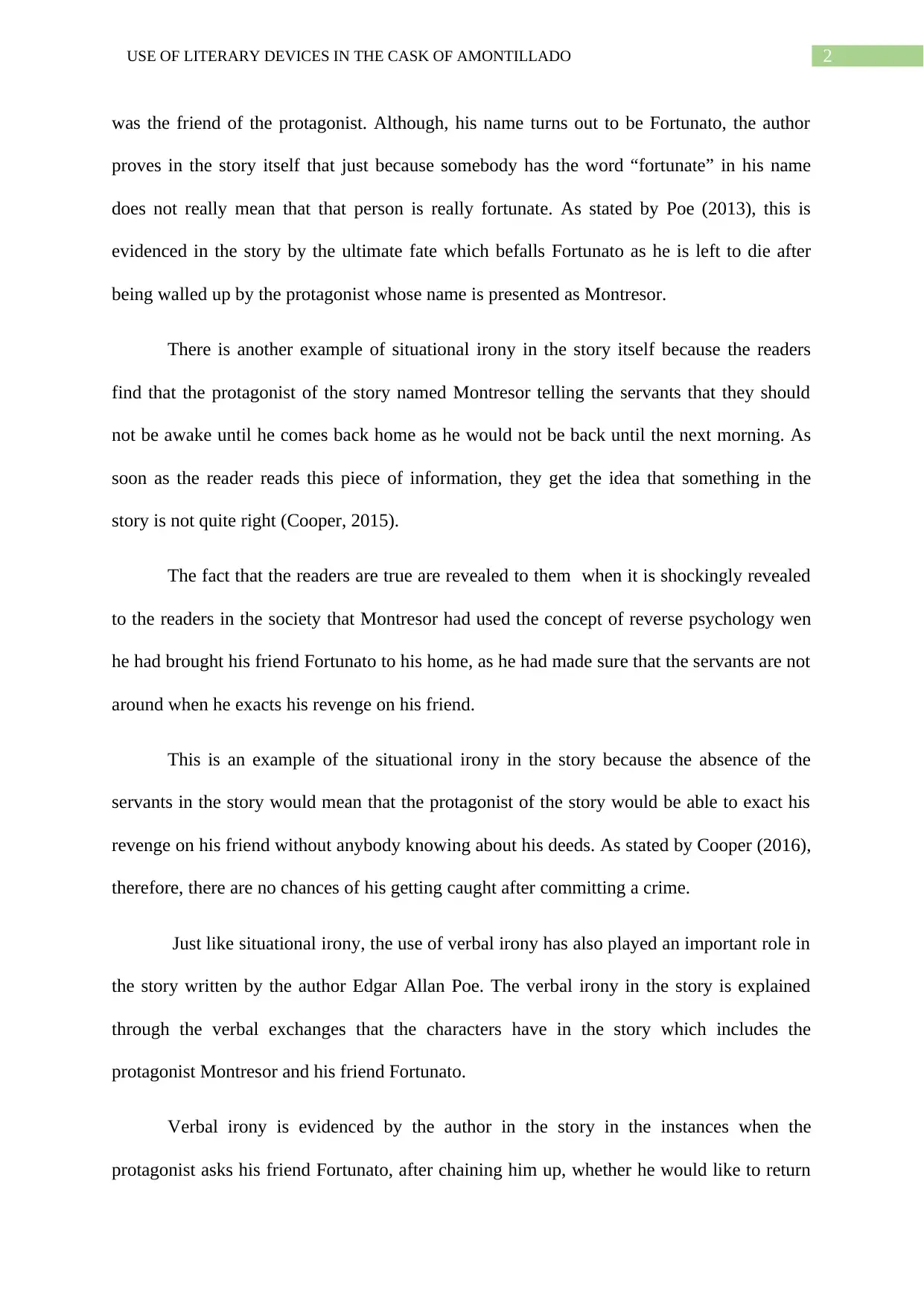
2USE OF LITERARY DEVICES IN THE CASK OF AMONTILLADO
was the friend of the protagonist. Although, his name turns out to be Fortunato, the author
proves in the story itself that just because somebody has the word “fortunate” in his name
does not really mean that that person is really fortunate. As stated by Poe (2013), this is
evidenced in the story by the ultimate fate which befalls Fortunato as he is left to die after
being walled up by the protagonist whose name is presented as Montresor.
There is another example of situational irony in the story itself because the readers
find that the protagonist of the story named Montresor telling the servants that they should
not be awake until he comes back home as he would not be back until the next morning. As
soon as the reader reads this piece of information, they get the idea that something in the
story is not quite right (Cooper, 2015).
The fact that the readers are true are revealed to them when it is shockingly revealed
to the readers in the society that Montresor had used the concept of reverse psychology wen
he had brought his friend Fortunato to his home, as he had made sure that the servants are not
around when he exacts his revenge on his friend.
This is an example of the situational irony in the story because the absence of the
servants in the story would mean that the protagonist of the story would be able to exact his
revenge on his friend without anybody knowing about his deeds. As stated by Cooper (2016),
therefore, there are no chances of his getting caught after committing a crime.
Just like situational irony, the use of verbal irony has also played an important role in
the story written by the author Edgar Allan Poe. The verbal irony in the story is explained
through the verbal exchanges that the characters have in the story which includes the
protagonist Montresor and his friend Fortunato.
Verbal irony is evidenced by the author in the story in the instances when the
protagonist asks his friend Fortunato, after chaining him up, whether he would like to return
was the friend of the protagonist. Although, his name turns out to be Fortunato, the author
proves in the story itself that just because somebody has the word “fortunate” in his name
does not really mean that that person is really fortunate. As stated by Poe (2013), this is
evidenced in the story by the ultimate fate which befalls Fortunato as he is left to die after
being walled up by the protagonist whose name is presented as Montresor.
There is another example of situational irony in the story itself because the readers
find that the protagonist of the story named Montresor telling the servants that they should
not be awake until he comes back home as he would not be back until the next morning. As
soon as the reader reads this piece of information, they get the idea that something in the
story is not quite right (Cooper, 2015).
The fact that the readers are true are revealed to them when it is shockingly revealed
to the readers in the society that Montresor had used the concept of reverse psychology wen
he had brought his friend Fortunato to his home, as he had made sure that the servants are not
around when he exacts his revenge on his friend.
This is an example of the situational irony in the story because the absence of the
servants in the story would mean that the protagonist of the story would be able to exact his
revenge on his friend without anybody knowing about his deeds. As stated by Cooper (2016),
therefore, there are no chances of his getting caught after committing a crime.
Just like situational irony, the use of verbal irony has also played an important role in
the story written by the author Edgar Allan Poe. The verbal irony in the story is explained
through the verbal exchanges that the characters have in the story which includes the
protagonist Montresor and his friend Fortunato.
Verbal irony is evidenced by the author in the story in the instances when the
protagonist asks his friend Fortunato, after chaining him up, whether he would like to return
⊘ This is a preview!⊘
Do you want full access?
Subscribe today to unlock all pages.

Trusted by 1+ million students worldwide
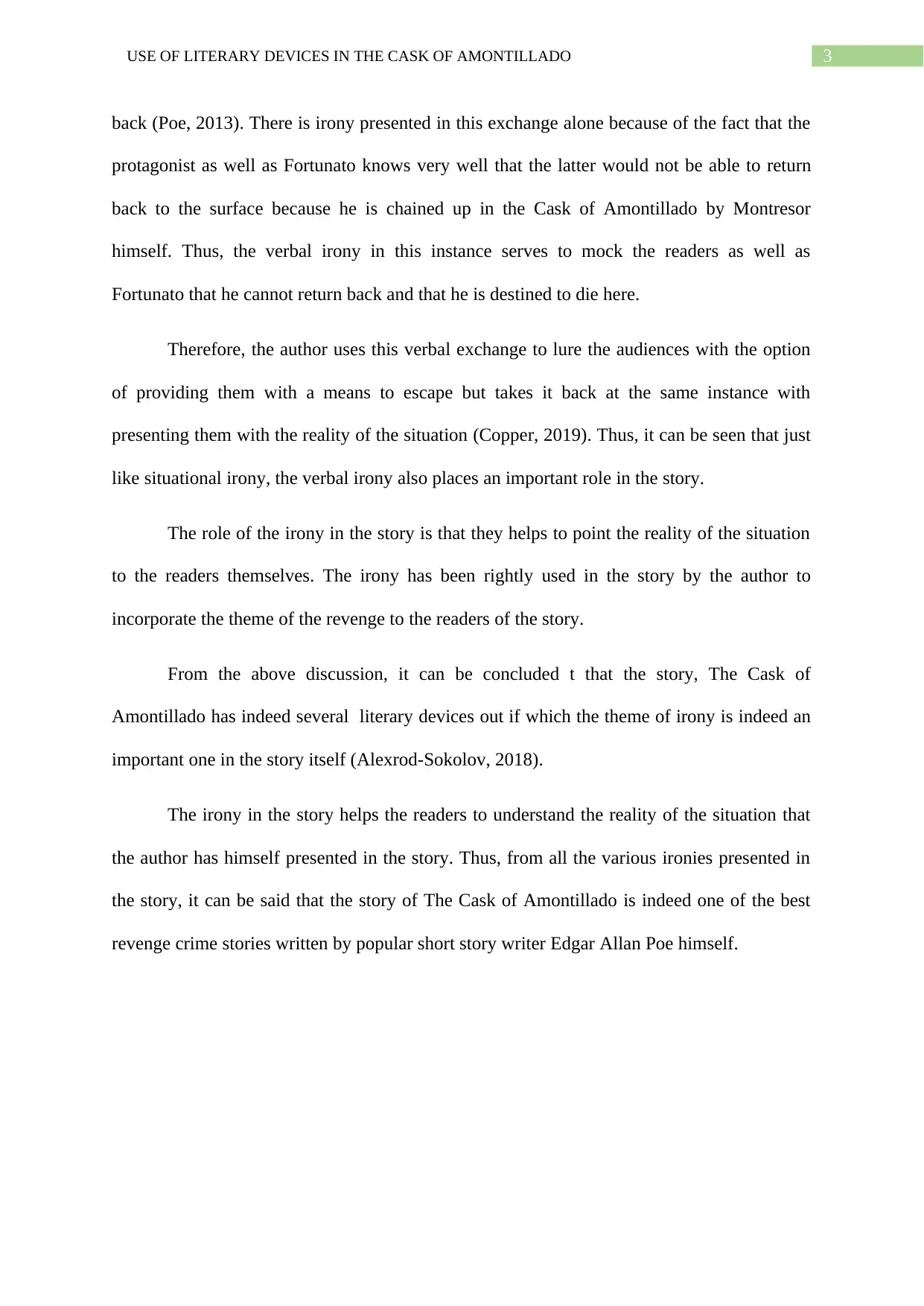
3USE OF LITERARY DEVICES IN THE CASK OF AMONTILLADO
back (Poe, 2013). There is irony presented in this exchange alone because of the fact that the
protagonist as well as Fortunato knows very well that the latter would not be able to return
back to the surface because he is chained up in the Cask of Amontillado by Montresor
himself. Thus, the verbal irony in this instance serves to mock the readers as well as
Fortunato that he cannot return back and that he is destined to die here.
Therefore, the author uses this verbal exchange to lure the audiences with the option
of providing them with a means to escape but takes it back at the same instance with
presenting them with the reality of the situation (Copper, 2019). Thus, it can be seen that just
like situational irony, the verbal irony also places an important role in the story.
The role of the irony in the story is that they helps to point the reality of the situation
to the readers themselves. The irony has been rightly used in the story by the author to
incorporate the theme of the revenge to the readers of the story.
From the above discussion, it can be concluded t that the story, The Cask of
Amontillado has indeed several literary devices out if which the theme of irony is indeed an
important one in the story itself (Alexrod-Sokolov, 2018).
The irony in the story helps the readers to understand the reality of the situation that
the author has himself presented in the story. Thus, from all the various ironies presented in
the story, it can be said that the story of The Cask of Amontillado is indeed one of the best
revenge crime stories written by popular short story writer Edgar Allan Poe himself.
back (Poe, 2013). There is irony presented in this exchange alone because of the fact that the
protagonist as well as Fortunato knows very well that the latter would not be able to return
back to the surface because he is chained up in the Cask of Amontillado by Montresor
himself. Thus, the verbal irony in this instance serves to mock the readers as well as
Fortunato that he cannot return back and that he is destined to die here.
Therefore, the author uses this verbal exchange to lure the audiences with the option
of providing them with a means to escape but takes it back at the same instance with
presenting them with the reality of the situation (Copper, 2019). Thus, it can be seen that just
like situational irony, the verbal irony also places an important role in the story.
The role of the irony in the story is that they helps to point the reality of the situation
to the readers themselves. The irony has been rightly used in the story by the author to
incorporate the theme of the revenge to the readers of the story.
From the above discussion, it can be concluded t that the story, The Cask of
Amontillado has indeed several literary devices out if which the theme of irony is indeed an
important one in the story itself (Alexrod-Sokolov, 2018).
The irony in the story helps the readers to understand the reality of the situation that
the author has himself presented in the story. Thus, from all the various ironies presented in
the story, it can be said that the story of The Cask of Amontillado is indeed one of the best
revenge crime stories written by popular short story writer Edgar Allan Poe himself.
Paraphrase This Document
Need a fresh take? Get an instant paraphrase of this document with our AI Paraphraser
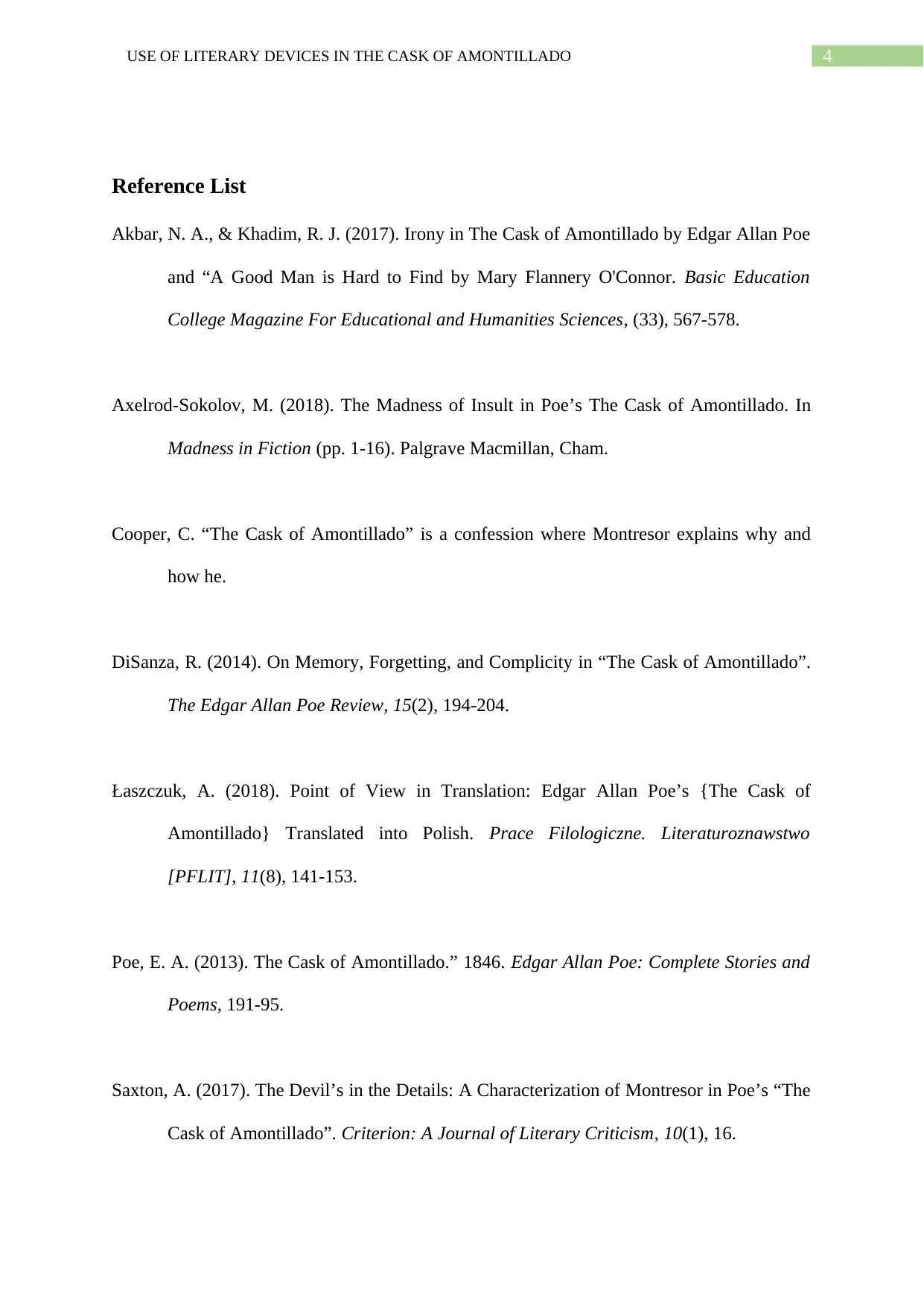
4USE OF LITERARY DEVICES IN THE CASK OF AMONTILLADO
Reference List
Akbar, N. A., & Khadim, R. J. (2017). Irony in The Cask of Amontillado by Edgar Allan Poe
and “A Good Man is Hard to Find by Mary Flannery O'Connor. Basic Education
College Magazine For Educational and Humanities Sciences, (33), 567-578.
Axelrod-Sokolov, M. (2018). The Madness of Insult in Poe’s The Cask of Amontillado. In
Madness in Fiction (pp. 1-16). Palgrave Macmillan, Cham.
Cooper, C. “The Cask of Amontillado” is a confession where Montresor explains why and
how he.
DiSanza, R. (2014). On Memory, Forgetting, and Complicity in “The Cask of Amontillado”.
The Edgar Allan Poe Review, 15(2), 194-204.
Łaszczuk, A. (2018). Point of View in Translation: Edgar Allan Poe’s {The Cask of
Amontillado} Translated into Polish. Prace Filologiczne. Literaturoznawstwo
[PFLIT], 11(8), 141-153.
Poe, E. A. (2013). The Cask of Amontillado.” 1846. Edgar Allan Poe: Complete Stories and
Poems, 191-95.
Saxton, A. (2017). The Devil’s in the Details: A Characterization of Montresor in Poe’s “The
Cask of Amontillado”. Criterion: A Journal of Literary Criticism, 10(1), 16.
Reference List
Akbar, N. A., & Khadim, R. J. (2017). Irony in The Cask of Amontillado by Edgar Allan Poe
and “A Good Man is Hard to Find by Mary Flannery O'Connor. Basic Education
College Magazine For Educational and Humanities Sciences, (33), 567-578.
Axelrod-Sokolov, M. (2018). The Madness of Insult in Poe’s The Cask of Amontillado. In
Madness in Fiction (pp. 1-16). Palgrave Macmillan, Cham.
Cooper, C. “The Cask of Amontillado” is a confession where Montresor explains why and
how he.
DiSanza, R. (2014). On Memory, Forgetting, and Complicity in “The Cask of Amontillado”.
The Edgar Allan Poe Review, 15(2), 194-204.
Łaszczuk, A. (2018). Point of View in Translation: Edgar Allan Poe’s {The Cask of
Amontillado} Translated into Polish. Prace Filologiczne. Literaturoznawstwo
[PFLIT], 11(8), 141-153.
Poe, E. A. (2013). The Cask of Amontillado.” 1846. Edgar Allan Poe: Complete Stories and
Poems, 191-95.
Saxton, A. (2017). The Devil’s in the Details: A Characterization of Montresor in Poe’s “The
Cask of Amontillado”. Criterion: A Journal of Literary Criticism, 10(1), 16.

5USE OF LITERARY DEVICES IN THE CASK OF AMONTILLADO
Spears, S. (2016). A Place for Poe: The Foreign in Two Tales of the Gothic.
Waters, C. (2018). The Color of Amontillado: The Influence of Blackface Minstrelsy in “The
Cask of Amontillado”. The Edgar Allan Poe Review, 19(1), 39-52.
Spears, S. (2016). A Place for Poe: The Foreign in Two Tales of the Gothic.
Waters, C. (2018). The Color of Amontillado: The Influence of Blackface Minstrelsy in “The
Cask of Amontillado”. The Edgar Allan Poe Review, 19(1), 39-52.
⊘ This is a preview!⊘
Do you want full access?
Subscribe today to unlock all pages.

Trusted by 1+ million students worldwide
1 out of 6
Related Documents
Your All-in-One AI-Powered Toolkit for Academic Success.
+13062052269
info@desklib.com
Available 24*7 on WhatsApp / Email
![[object Object]](/_next/static/media/star-bottom.7253800d.svg)
Unlock your academic potential
Copyright © 2020–2026 A2Z Services. All Rights Reserved. Developed and managed by ZUCOL.





